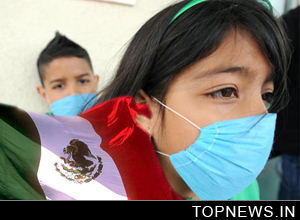Mexico increases confirmed swine flu count to 49
 Mexico City/Geneva - The number of confirmed swine flu infections in Mexico rose from 26 to 49, with seven deaths as a result of the new strain, according to laboratory results made public Wednesday by health authorities.
Mexico City/Geneva - The number of confirmed swine flu infections in Mexico rose from 26 to 49, with seven deaths as a result of the new strain, according to laboratory results made public Wednesday by health authorities.
There have been 159 deaths and 2,498 infections in Mexico's flu outbreak. Of these, 1,311 people remain in hospital and most have not yet been identified as swine flu cases.
World Health Organization (WHO) Director General Margaret Chan raised the pandemic alert for swine flu by one level to phase 5 Wednesday night in Geneva.
The declaration of Phase 5 is a strong signal that a pandemic is imminent. It is characterized by human-to-human spread of the virus into at least two countries in one WHO region.
WHO reported confirmed swine flu cases in Canada, the United States, Mexico, Israel, Spain, Britain and New Zealand. Costa Rica said it had two confirmed cases and 25 suspected cases were pending testing.
Chan said all countries should activate pandemic flu plans and called on governments and health authorities to be on high alert for influenza-like illnesses and pneumonia.
WHO said the decision to make the transition to phase 5 was based on the geographical spread of the disease as well as the fact that evidence supported sustained human-to-human transmission at the community level.
"We are seeing this in Mexico, and as information emerges from the US authorities we are also seeing that there," Chan said.
Mexico City said Wednesday that it would compensate workers impacted by restrictions imposed to combat the outbreak of swine flu. Those hospitalized would also be compensated, government officials said.
Mexico City's Finance Minister Mario Delgado told a press conference Wednesday that the government would give 50 pesos (about 4 dollars) per day to those workers who have suffered because of the limitations on movement and closure of several establishments.
Those hospitalized were to be compensated with 3,000 pesos (about 200 dollars), Delgado said.
On Tuesday, the government of Mexico City banned restaurants from serving food on their premises, although they can sell take-away meals. The move affected an estimated 35,000 restaurants and some 450,000 jobs.
Meanwhile, Mexico's central bank said Wednesday that it expects gross domestic product to contract by 3.8 to 4.8 per cent in 2009, a considerably more pessimistic outlook than its previous forecasts that could get worse in the light of the current flu outbreak.
The bank noted that the expected contraction was due to the global financial crisis, with the flu outbreak an additional risk factor that could affect "all levels of productive activity" in the second quarter of the year.
"Given how recent this event (the flu) is, it is not possible to know how long it will last and how intense it will be, so we can also not predict what effects it will have on variables like inflation, growth and the exchange rate," the bank said in a statement.
Argentina suspended flights to and from Mexico from Wednesday until at least Monday, as it awaited test results of three suspected cases of swine flu.
Body temperature sensors, similar to those put into wide use during the 2003 SARS outbreak, were installed at Ezeiza airport in Buenos Aires.
Cuba Tuesday suspended flights to and from Mexico. The measure was to last 48 hours, but was later extended indefinitely, according to an official statement published Wednesday in Communist Party daily Granma.
Brazil was monitoring 36 people with swine-flu-like symptoms, although only two were described as suspected cases, Health Minister Jose Gomes Temporaom said. (dpa)